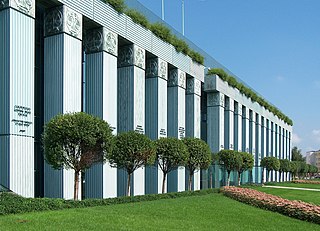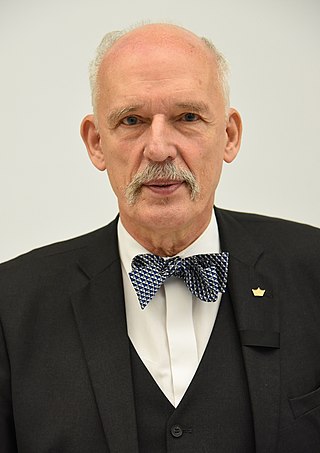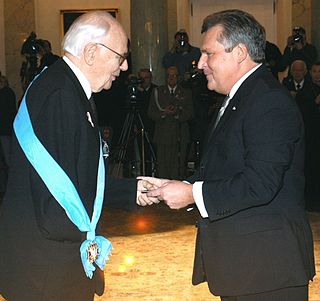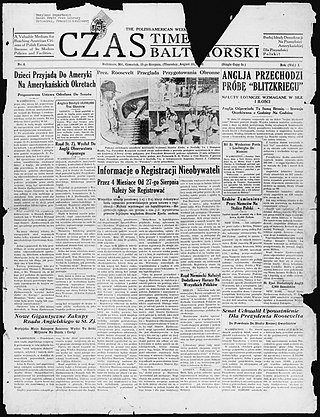
Rafał Aleksander Ziemkiewicz is a Polish political and science fiction author and right-wing publicist. Winner of the Janusz A. Zajdel Award.

The Supreme Court is the highest court in the Republic of Poland. It is located in the Krasiński Square, Warsaw.

Janusz Ryszard Korwin-Mikke, also known by his initials JKM or simply as Korwin, is a Polish far-right politician, paleolibertarian and author. He was a member of the European Parliament from 2014 until 2018. He was the leader of the Congress of the New Right (KNP), which was formed in 2011 from Liberty and Lawfulness, which he led from its formation in 2009, and the Real Politics Union, which he led from 1990 to 1997 and from 1999 to 2003. He was the chairman of the party KORWiN until his resignation on 15 October 2022, and from 2019 to 2023 a member of the Sejm, elected from the electoral list of Confederation Liberty and Independence.
Union of Poles in Lithuania is an organization formed in 1989 to bring together members of Polish minority in Lithuania. It numbers between 6,000 to 11,000 members. It defends the civil rights of the Polish minority and engages in educational, cultural and economic activities. It is the largest Polish organization in Lithuania, and was created in 1990.

Dariusz Ratajczak was a Polish historian, publicist and right-wing activist. In 1999, he was convicted of Holocaust denial in Poland.

Jerzy Kazimierz Kłoczowski was a Polish historian, professor at the John Paul II Catholic University of Lublin, and former member of the Polish Senate. During World War II, Kłoczowski was a soldier of the Home Army and participated in the Warsaw Uprising, where he was seriously injured and lost his right hand. On leaving the military hospital in April 1945, he went to Adam Mickiewicz University in Poznań and then to Nicolaus Copernicus University in Toruń, where he earned a degree and a Ph.D. (1950). Member of the anti-communist Solidarity movement – after the fall of communism in Poland, Kłoczowski was elected Senator and member of the Commission for Foreign Affairs of the Senate, as well as the representative of the Polish Parliament at the Council of Europe.

Piotr Gontarczyk is a Polish historian with a doctorate in history and political science.
The Supreme National Tribunal was a war-crime tribunal active in communist-era Poland from 1946 to 1948. Its aims and purpose were defined by the State National Council in decrees of 22 January and 17 October 1946 and 11 April 1947. The new law was based on an earlier decree of 31 August 1944 issued by the new Soviet-imposed Polish regime, with jurisdiction over "fascist-Hitlerite criminals and traitors to the Polish nation". The Tribunal presided over seven high-profile cases involving a total of 49 individuals.
Television in Poland was introduced on an experimental basis in 1937. It was state owned, and was interrupted by the Second World War in 1939. Television returned to Poland in 1952 and for several decades was controlled by the communist government. Colour television was introduced in Poland in 1971. Private television stations in Poland appeared around the time of the fall of communism, with PTV Echo becoming the first private station in Poland.

Piotr Śmietański was a Polish non-commissioned officer and communist functionary in the Ministry of Public Security and executioner at Mokotów Prison.

Tomasz Krzysztof Sommer is a Polish writer, journalist and publisher, editor-in-chief of weekly magazine Najwyższy Czas!. Sommer graduated from the University of Warsaw Department of Journalism and Political Science, and received his Ph.D. in sociology at the School of Social Sciences of the Polish Academy of Sciences Institute of Philosophy and Sociology.

Days of Honour is a Polish World War II television drama series, broadcast on TVP2 from 7 September 2008 to 23 November 2014, on STV Glasgow from 2 June 2014 and STV Edinburgh from 16 January 2015.
Anka Grupińska is a Polish dissident, journalist and writer. She co-founded the periodical Czas Kultury.
The Easter Pogrom was a series of assaults on the Jewish populations of Warsaw and Kraków, Poland, between 22 and 30 March 1940, while Poland was occupied by the Germans in World War II.

Czas Baltimorski was a short-lived weekly Polish-language newspaper that began publication on July 11, 1940, in Baltimore, Maryland. It was published by the Polish-American Times, Inc. with Wladyslaw A. Wusza as founding editor. Wusza and his English language editor Stanley A. Ciesielski were both young, second generation Polish-Americans, and Wusza's father had been editor of a Polish-language newspaper in New York City.

Krzysztof Ireneusz Rybiński is a Polish economist and author, professor of social sciences, vice-president of the National Bank of Poland (2004–2008).

Time in Poland is given by Central European Time. Daylight saving time, which moves an hour ahead, is observed from the last Sunday in March to the last Sunday in October. This is shared with several other EU member states.

Weszło is a media and sports group founded in 2008 by Krzysztof Stanowski. At the beginning it was mainly involved in football, with time it expanded to other disciplines.

KTW is a complex of two high-rise buildings in Katowice, Poland. KTW I, the first building of the project, was completed in 2018 at 66 metres (217 ft). The second tower, KTW II, rises 134 metres (440 ft) and was finished in 2022; it is the tallest building in Katowice and in the Upper Silesia region.













